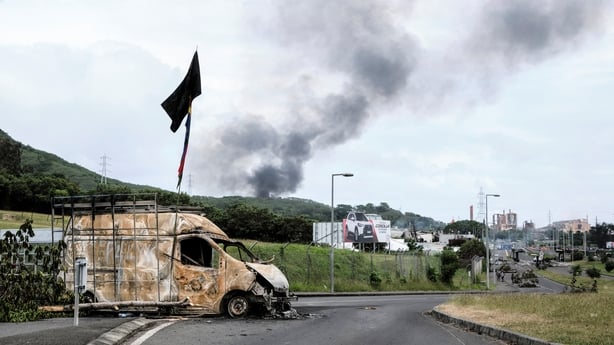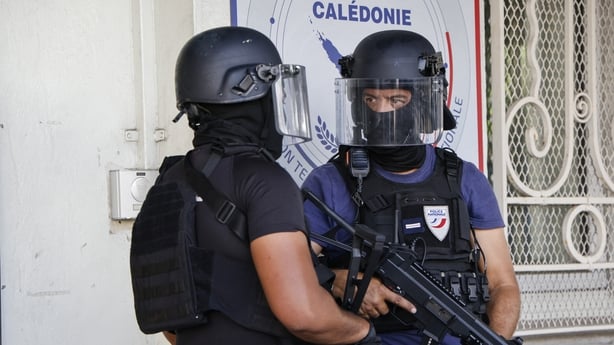The state of emergency in New Caledonia that was imposed to quell deadly rioting has lifted.
Earlier, the French presidency said that 480 gendarmes were being sent to the Pacific territory as reinforcements.
The lifting of the blockades is "the necessary condition for the opening of concrete and serious negotiations", the French presidency added in its statement, which said the state of emergency would be lifted at 7pm Irish time.
"The President has decided for the time being not to extend the state of emergency" beyond its legal deadline of 12 days to allow for meetings with the pro-independence FLNKS party, the Élysée said in a statement.
Seven people have been killed in New Caledonia since riots over planned voting reforms erupted on 13 May.
Paris enforced the state of emergency two weeks ago, flying in hundreds of police and military reinforcements to restore order in the archipelago, which lies around 17,000km from mainland France.
The French government hopes that this easing of restrictions will enable dialogue to be re-established on the many blockades still in place that have paralysed the archipelago.

President Emmanuel Macron flew to the Pacific archipelago on Thursday in an urgent bid to defuse the crisis, with the situation gradually easing over the past few days.
On Friday, France's Prime Minister Gabriel Attal said the situation "remains extremely fragile".
Read More:
Macron to makes high-stakes visit to New Caledonia
Why are there riots in New Caledonia against France's voting reform?
Why did France ban TikTok in Pacific New Caledonia?
Police are struggling to control certain districts of the capital Noumea and the international airport will remain closed to commercial flights until at least 2 June.
The first French tourists were evacuated on Saturday from Noumea aboard military aircraft headed for Australia and New Zealand, which began repatriating their nationals last Tuesday.
The Élysée also announced "seven additional mobile force units, ie 480 mobile gendarmes" would be sent to New Caledonia as reinforcements.
In total, around 3,500 troops have been deployed to the archipelago, where two gendarmes died during the riots over planned voting reforms.
New Caledonia has been ruled from Paris since the 1800s, but many indigenous Kanaks still resent France's power over their islands and want fuller autonomy or independence.

France is planning to give voting rights to thousands of non-indigenous long-term residents, something Kanaks say would dilute the influence of their votes.
Mr Macron pledged during his lightning trip to New Caledonia that the planned voting reforms "will not be forced through".
"Violence should never be allowed to take root," Mr Macron said told journalists at the end of his visit, adding that all roadblocks should be "immediately" removed.
Christian Tein, leader of the CCAT, the pro-independence group organising the protests, did not call off the roadblocks, but said on Friday that he wanted to "loosen the noose a little" so that fuel and medicines could be delivered.
"This is our priority," he said.
The FLNKS party reiterated on Saturday its demand for the withdrawal of the voting reforms after meeting with Macron.
The president said he would be willing to hold a referendum on the contentious changes, though he hoped that elected New Caledonia officials would be able to reach an agreement.

